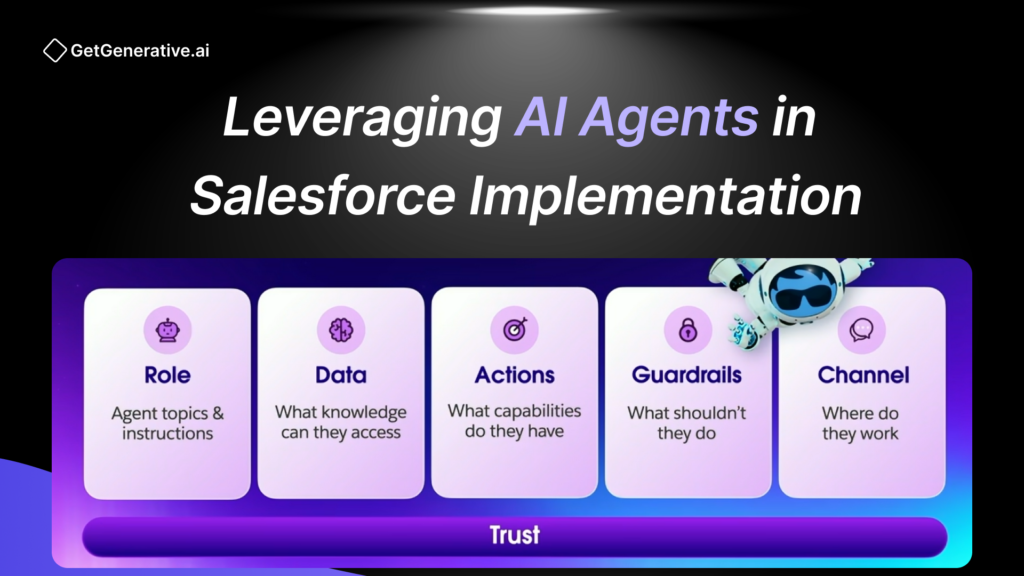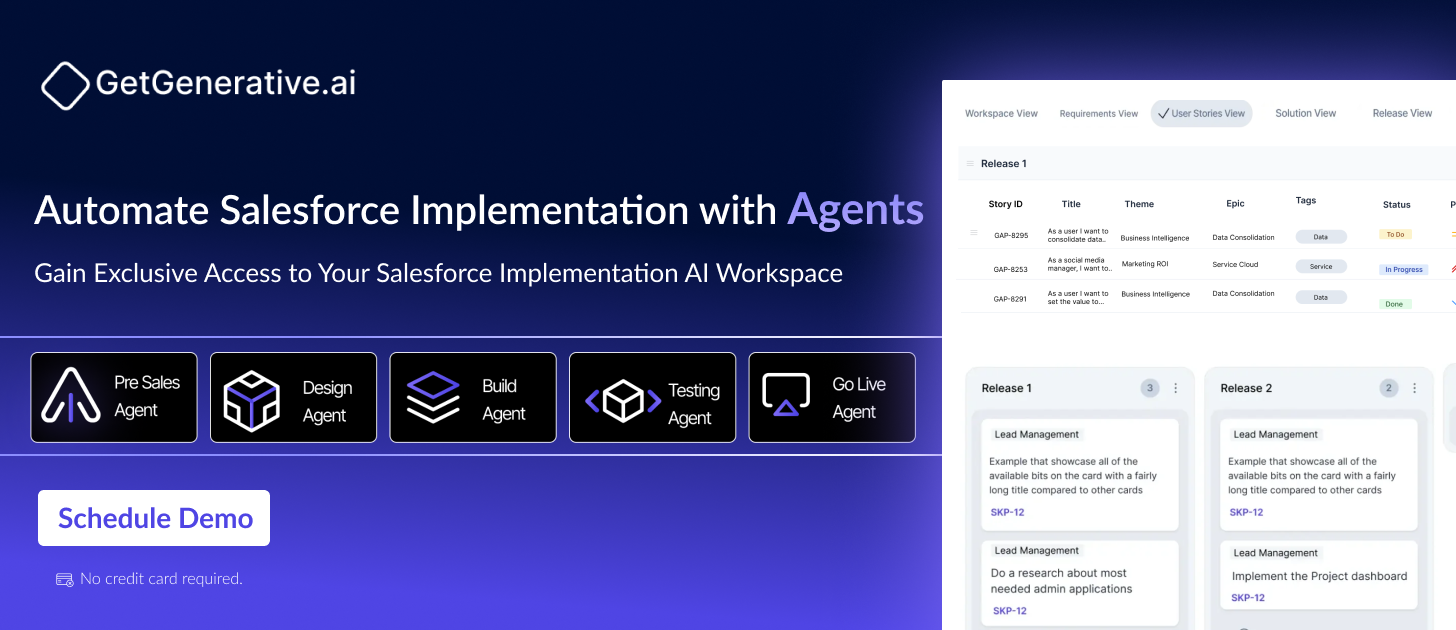Leveraging AI Agents in Salesforce Implementation
AI agents are intelligent tools designed to perform tasks autonomously by leveraging data, workflows, and AI-driven insights. They can execute actions, provide solutions, and seamlessly collaborate with human counterparts when required.
These agents are deeply integrated within Salesforce platforms like Agentforce and Service Cloud Einstein, enhancing their capabilities to deliver unparalleled customer experiences. They are not limited to answering questions; they can take action, learn from interactions, and continuously refine their outputs.
Core Features of AI Agents in Salesforce
AI agents in Salesforce are designed with advanced capabilities that differentiate them from traditional automation tools.
Contextual Data Integration
AI agents seamlessly access data from Salesforce CRM and external sources. This ensures they have the most relevant and up-to-date information to support their tasks, whether assisting a customer or analyzing a lead.
Action Execution
AI agents don’t just offer recommendations; they take action. From updating records to assigning tasks, they automate processes that would otherwise require manual effort.
Continuous Learning
These agents adapt and improve over time. They use machine learning to refine their performance, ensuring better accuracy and efficiency with every interaction.
Enhanced Security
Salesforce AI agents operate with built-in trust layers. This ensures sensitive customer data is protected and accessible only to authorized users.
Also Read – AI Ethics Maturity Model
How AI Agents Revolutionize Salesforce Implementation
AI agents are transforming how businesses deploy and utilize Salesforce. By automating and optimizing workflows, they are becoming integral to successful Salesforce implementations.
Streamlining Customer Support
AI agents powered by platforms like Agentforce and Einstein Bots redefine customer support. They handle simple, repetitive queries autonomously, allowing human agents to focus on more complex cases. These agents provide 24/7 support, ensuring customers receive timely responses.
Optimizing Workflow Automation
From routing leads to assigning tasks, AI agents streamline workflows within Salesforce. They ensure tasks are completed efficiently, reducing bottlenecks and improving overall productivity.
Practical Use Cases of AI Agents in Salesforce
Enhancing Customer Support with AI-Powered Bots
AI-powered chatbots handle customer queries autonomously, providing instant resolutions for routine issues. They escalate complex cases to human agents with detailed context, ensuring seamless handoffs and superior customer experiences. These bots also learn from interactions, becoming more effective over time.
Intelligent Case Management
AI agents streamline case management by automating the routing and classification of customer service cases. They ensure cases are directed to the most appropriate agent, reducing resolution times and boosting efficiency.
Personalized Marketing Campaigns
AI agents help create personalized marketing strategies by analyzing customer preferences, purchase histories, and engagement patterns. This ensures campaigns are highly targeted and effective.
Employee Support and Internal Processes
AI agents extend their capabilities beyond customer-facing functions. They assist employees by automating repetitive internal processes, such as onboarding, training, and HR queries, improving overall productivity.
Also Read – Generative AI vs. Predictive AI: What’s the Difference?
Overcoming Challenges in Implementing AI Agents
Despite their advantages, implementing AI agents in Salesforce can come with challenges. Recognizing and addressing these issues is key to maximizing their potential.
Adapting to Organizational Change
Integrating AI agents involves a cultural shift. Teams may initially resist adopting AI-driven workflows. Providing comprehensive training and showcasing the benefits of AI agents can encourage acceptance and smooth the transition.
Data Quality and Integration
AI agents depend on accurate and up-to-date data. Organizations must prioritize data governance and ensure seamless integration between Salesforce and external systems.
Fine-Tuning AI for Optimal Performance
AI agents require ongoing monitoring and refinement. Regular testing and feedback loops ensure they adapt to evolving business needs and deliver consistent results.
Future Trends in AI and Salesforce
As AI technology evolves, its role in Salesforce implementations will continue to expand. Here are some trends shaping the future:
Deeper Personalization
AI agents will become even more adept at tailoring interactions to individual customer preferences, offering hyper-personalized experiences that strengthen customer relationships.
AI-Driven Innovation
AI agents will drive innovation by automating complex processes, fostering collaboration between humans and machines, and enabling businesses to explore new opportunities.
Integration with Emerging Technologies
The integration of AI with technologies like the Internet of Things (IoT) and augmented reality (AR) will unlock new possibilities, transforming how businesses interact with customers and manage operations.
Also Read – How Much Can You Earn as an AI Consultant in 2025?
Conclusion
AI agents are redefining Salesforce implementations by streamlining workflows, improving decision-making, and offering tailored customer interactions. These intelligent tools enable businesses to operate more efficiently and scale effortlessly. With the continuous evolution of AI technology, the opportunities for leveraging AI agents within Salesforce are limitless.
For further insights, explore GetGenerative.ai.
FAQs
1. How do AI agents improve customer support?
AI agents handle routine queries, escalate complex issues to human agents, and provide instant resolutions, ensuring seamless and efficient customer service.
2. What are the key challenges in implementing AI agents?
Common challenges include data security, organizational resistance to change, ensuring data quality, and the need for continuous monitoring and refinement.
3. Can AI agents be used for internal processes?
Yes, AI agents can automate internal workflows, such as employee onboarding, HR queries, and training, improving operational efficiency across departments.
4. How can businesses prepare for AI agent implementation?
Organizations should focus on data governance, employee training, and incremental rollout strategies to ensure a smooth and successful integration of AI agents into Salesforce.




